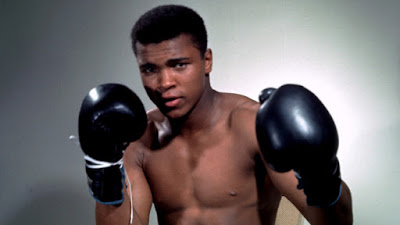Allah is One
Wednesday, 29 June 2016
Saturday, 4 June 2016
Muhammad Ali, simply ‘The Greatest’, dead at 74
 |
| Muhammad Ali, simply ‘The Greatest’, dead at 74 |
Muhammad Ali, the eloquent, colorful, controversial and brilliant three-time heavyweight boxing champion who was known as much for his social conscience and staunch opposition to the Vietnam War as for his dazzling boxing skills, died Friday.
He was 74.Once the most outrageous trash talker in sports, he was largely muted for the last quarter century of his life, quieted by a battle with Parkinson’s Disease.
Born Cassius Marcellus Clay Jr. on Jan. 17, 1942, in Louisville, Ky., Ali learned to box after his bicycle was stolen when he was 12 years old. When young Clay vowed to “whoop the behind” of the thief, a local police officer encouraged him to learn to box to channel his energy.
He would go on to become known as “The Greatest,” and at his peak in the 1970s was among the most recognizable faces on Earth.
He was known for his tendency to recite poems while making predictions about his fights – “Float like a butterfly, sting like a bee. The hands can’t hit what the eyes can’t see.” – as well as for giving opponents often unflattering nicknames. He referred to Sonny Liston as “the big ugly bear,” George Chuvalo as “The Washerwoman,” Floyd Patterson as “The Rabbit” and Earnie Shavers as “The Acorn.”
 |
| Muhammad Ali, simply ‘The Greatest’, dead at 74 |
When Ali prepared to meet Frazier for a third time in Manila, Philippines, on Oct. 1, 1975, he frequently carried a toy rubber gorilla with him. At one news conference, he pulled the gorilla out of his pocket and began punching it as he said, “It’s going to be a killa and a thrilla and a chilla when I get the gorilla in Manila.”
Frazier, though, took it personally and harbored a decades-long grudge.
“It sure did bother him,” Gene Kilroy, Ali’s friend for more than 50 years, told Yahoo Sports.
Kilroy said Ali was simply promoting the fights and meant no harm, and said Ali regretted the impact his words had upon Frazier.
“I used to tell Ali, ‘Someday, me, you and Joe are going to be three old men sitting in the park laughing about all that [expletive],’ ” Kilroy recalled. “And Ali said, ‘That would be great!’ I talked to Joe and Joe said, ‘No, [expletive] him. I don’t want to be with him.’ But he loosened up later and they mended fences.
Not long before Frazier’s death in 2011, he attended an autograph signing and memorabilia show in Las Vegas. Frazier grabbed a copy of an old Sports Illustrated magazine that had a photo of the two fighters and promoter Don King on the cover.
“Man,” he said, sounding wistful, “we gave the people some memories, me and Ali.”
Ali was at the peak of his professional powers after knocking out Zora Folley in New York on March 22, 1967. He battered Folley throughout and stopped him in the seventh.
After the bout, Folley shared his thoughts with Sports Illustrated.
“The right hands Ali hit me with just had no business landing – but they did. They came from nowhere,” Folley said. “… He’s smart. The trickiest fighter I’ve seen. He’s had 29 fights and acts like he’s had a hundred. He could write the book on boxing, and anyone that fights him should be made to read it first.”
 |
| Muhammad Ali, simply ‘The Greatest’, dead at 74 |
Ali had converted to Islam in 1964 after the first of his two wins over Liston, and changed his name from Cassius Clay. He said Islam was a religion of peace and that he had no desire to engage in combat with those who’d done him or his family no harm.
This all went down at the height of the civil rights movement.
“Shoot them for what?” Ali asked in an interview after he refused induction. “They never called me nigger. They never lynched me. They never put dogs on me. They didn’t rob me of my nationality, rape and kill my mother and father. What do I want to shoot them for, for what? Why do I want to go shoot them, poor little people and babies and children and women? How can I shoot them? Just take me to jail.”
Subscribe to:
Comments (Atom)